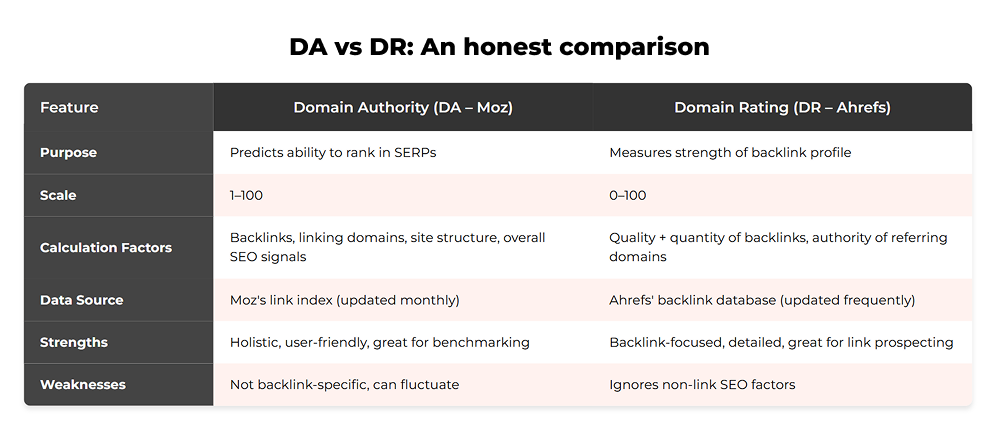So, as a link-building SEO professional working for a brand/business, picture this scenario: you are in the middle of a weekly client call. Numbers are flying around the virtual meeting room: rankings, conversions, traffic. Then, someone inevitably drops the question:
“But wait… what’s our DA? And how does it compare to their DR?”
You feel the tension rising. Half the team thinks DA (Domain Authority) is the gold standard. The other half swears by DR (Domain Rating). You’re stuck explaining that, but wait, surprise! Google doesn’t use either in its algorithm.
Sound familiar?
This little debate has become almost a rite of passage in SEO circles. And if you’ve ever scrambled to answer it with authority, this blog is for you.
At Mavlers, we’ve been building links for over a decade, with more than 20,000 placements for 100+ clients, to be precise. We’ve seen both metrics celebrated, misunderstood, and weaponized in pitches.
And here’s the truth: neither DA nor DR should be your North Star, but both can help you navigate link-building smarter.
Let’s unpack this once and for all.
But why do SEO metrics matter in the first place?
SEO is an odd game. It’s not like sales, where you can tally revenue, or paid ads, where ROI is immediate. Authority is invisible; it builds slowly and shows up in rankings later.
So we cling to proxies. Numbers that help us make sense of progress. One may think of DA and DR as the Fitbit trackers of SEO.
They don’t guarantee peak performance, but they give you signals: Are we moving in the right direction? Are our efforts paying off?
Now, let’s break down the two most-asked-about metrics in the industry.
Understanding the basics of Domain Authority (DA)
Back in 2010, Moz rolled out Domain Authority (DA) to help SEOs gauge how likely a site is to rank in search results. It’s scored on a 1–100 scale, with higher scores translating into stronger.
But what’s behind the number?
- Backlinks: How many other sites point to you and how authoritative those sites are.
- Linking root domains: Diversity matters. One hundred links from one site does not equal one link from 100 unique sites.
- Sitewide signals: Moz’s model also weighs in on overall SEO health, not just links.
Here’s why SEOs like DA
- Benchmarking: Easy to size yourself against competitors.
- Backlink evaluation: Offers a quick gut-check, links from DA 70+ sites look shinier than DA 20.
- Progress tracking: Watch your DA climb over time (though patience is key).
But, there are two sides to every coin, and here’s where DA falls short
- It’s broad. DA isn’t just about backlinks, so it’s less precise for link-building.
- It fluctuates. Scores shift when Moz updates its index, not necessarily when Google shifts rankings.
- It’s a third-party guess. Google doesn’t use DA at all.
One can think of DA like your credit score. It’s not the number the bank (Google) uses, but it influences how others perceive your trustworthiness.
Exploring the basics of Domain Rating (DR)
Fast-forward, and Ahrefs gave us Domain Rating (DR), its own 0–100 score that looks only at backlinks.
Here’s what fuels DR:
- Referring domains: How many unique sites link to you.
- Link quality: DR of those linking domains matters.
- Distribution: A natural spread of backlinks is rewarded.
Wondering why SEOs like DR? Well, here’s why!
- Laser focus: Purely backlink-driven. If links are your strategy, DR is your north star.
- Fresh data: Ahrefs’ index is updated constantly.
- Competitive intel: Perfect for seeing where you stand in the backlink arms race.
But like any other index, there are places where DR falls short;
- Narrow scope. It doesn’t care about content quality, UX, or on-page SEO.
- New site bias. A great site can have a low DR simply because it hasn’t built links yet.
- Also third-party. Again, Google doesn’t use DR directly.
You may choose to think of DR as your networking strength. The more high-profile friends (backlinks) you have vouching for you, the more impressive you look.
Now that we are clear on the basics of both metrics, let’s get down to decoding the actual differences between DA vs. DR in SEO.
DA vs. DR ~ An honest comparison
Well, here’s where most SEOs trip up: DA and DR are not interchangeable. They overlap, but their focus is different.

To summarize, while DA gives you a big-picture view of a domain’s potential, DR zooms in on backlinks specifically.
So, which one should you care about?
Well, to answer your question, here’s how we break it down for clients:
~ If you need boardroom-friendly benchmarks, lean on DA.
Stakeholders love a single, simple number that says “we’re stronger than them.”
~ If you’re actively building links, track DR.
Because it focuses on link quality, DR gives you sharper insights when prospecting.
~ If you’re in competitive, SEO-heavy industries, prioritize DR.
Tech, SaaS, and digital marketing niches live and die on backlinks.
If you want the big picture, we recommend using both, but don’t obsess.
Simply because neither metric is gospel, they’re guides, not goals.
Unveiling the hidden truth: Don’t get lost in the numbers!
Here’s something most marketers don’t admit to clients: DA and DR are not ranking factors.
Google doesn’t care about them. What it does care about:
- Relevance of links (a niche blog linking to you can beat a random DA 90 site)
- Context of placement (a link buried in a footer does not equal a link in a thought-leadership article)
- Traffic quality (can the link send you real visitors, not just “authority juice”?)
At Mavlers, we’ve seen it firsthand:
A client with a DA of 32 outranked competitors with a DA of 60+ because their backlinks were hyper-relevant and contextual. While another with a DR “plateau” saw a traffic surge simply from cleaning up toxic links and publishing better content.
Simply said, chasing metrics alone is a trap. Prioritizing relevance and quality is what moves the needle.
The final leg ~ Deciphering where DA and DR fit into your SEO journey
So, while both DA and DR are useful, it’s important to understand that neither is the endgame. They’re like the GPS on your phone, you’d be lost without them, but they’re not the destination.
The real road to SEO success looks something like;
- Building contextual, authoritative, and relevant links
- Publishing content worth linking to
- Nailing technical SEO and UX so users (and search engines) trust your site
At Mavlers, we use DA for the big picture and DR for the details, but we measure true success in traffic, rankings, and conversions. On that note, we figured, you might want to explore ~ The Ultimate Guide to SEO KPIs with Mavlers.
So next time someone asks, “What’s our DA vs DR?” you’ll know exactly how to answer:
“They’re useful signals, but what really matters is whether our links are helping us rank and convert. And here’s how we’re making that happen…”
Curious where your DA and DR stand and how to improve them the right way? Let’s chat. We also recommend reading ~ The Strategic Shift: Why Revenue Should Be Considered as a Secondary KPI for Your SEO Campaign.


Shubham Verma - Subject matter expert (SME)
Shubham Verma is a skilled Senior Link-Building Analyst at Mavlers with over 7+ years of experience. Expert in developing strategic link-building campaigns, Shubham enhances website authority and search engine rankings. Known for his meticulous approach and industry insights, Shubham delivers impactful results in the dynamic field of digital marketing.
Naina Sandhir - Content Writer
A content writer at Mavlers, Naina pens quirky, inimitable, and damn relatable content after an in-depth and critical dissection of the topic in question. When not hiking across the Himalayas, she can be found buried in a book with spectacles dangling off her nose!
An insight into the best B2B Google Ads strategies successfully deployed at Mavlers
Deep Dive Into The New HubSpot Form Editor: A Game-Changer for Marketers